Section A-1
人教版英语八上Unit3 I’m more outgoing than my sisiter. Section A(1a-1c)教案

Unit 3 I’m more outgoing than my sister.(Period 1:Section A 1a-1c)Teaching Aims:1. Knowledge Aims:1) Learn and be able to use the following words: outgoing, both, better, loudly, quietly;2) Review and master the following words: tall, short, long, thin, heavy, hair.3) Learn and grasp the following sentence structures :Sam has longer hair than Tom.Both Sam and Tom can play the drums,but Sam plays them better than Tom.I think she sang more clearly than Nelly.2. Ability Aims:1) Learn and know the rules of comparatives of adjectives/ adverbs and use themto talk about personal traits.2) Role-play the conversation with correct and clear pronunciation.3. Emotional Aims:1) Have further understanding of their friends or families.2) Find out the good traits of others.Important Points and Difficult Points:Important Points:1. Key words: outgoing, both, better, loudly, quietly2.The changing rules of comparative degree of adjectives andadverbs.Difficult Points:1. Compare people by using comparatives .2. The changing rules of comparative degree of adjectives and adverbs.Teaching Methods:Task-based Teaching Method, Situational Teaching Method,Interactive Teaching Method.Learning Methods: Preview(self-study),Cooperative learning, Drilling.Teaching Aids: multi-media, blackboard, text bookTeaching Steps:Step1.GreetingsT:Good afternoon,boys and girls! Ss: Good afternoon,Miss Liu!T: How are you! Ss: I’m fine.Thanks! How are you?T: I’m OK.Thank you! Sit down please!Step2.Lead-in1) Xiao Boqiao is tall. Liu Guifang is short.Xiao Boqiao is taller than Liu Guifang.Liu Guifang is shorter than Xiao Boqiao2) Liu Shuangsheng is fat. Tan Hong is thin.Liu Shuangsheng is fatter than Tan Hong.Tan Hong is thinner than Liu Shuangsheng.(Well done!Today we’re going to learn a new unit.Unit3 I’m more outgoing than my sister.)Step3.Presentation1.Present the title:Emphasize the word outgoing.2.Now let’s watch PPT and make more sentences like this.3.Check:can you tell the differences between them?The more,the better. Step4.Activity 1aT:Now please open your books to P17.Look at 1a,and match each word with its opposite.Step5.TalkingT:Here are three pairs of twins(Do you twins?Li ying and Li Qiong are twins.Sometimes they look exactlyalike,but not always.)Look at them and tell the differences about them.The first pair: 1.Sam has longer hair than Tom.2.Sam is taller than Tom.3.Sam plays the drums better than Tom.The second pair:1.Peter is heavier than Paul.2.Paul is shorter than Peter.The third pair: 1.Tina is taller than Tara.2.Tara is shorter than Tina.3.Tina sings more loudly than Tara.Step6.ListeningT: 1.Now let’s listen to three conversations.They are talking about the twins.You have to listen carefully and number them (1-3) in the picture.(Please listen to the key words: names)The first conversation is about Tom and Sam.The second conversation is about Tara and Tina.The third conversation is about Paul and Peter.Step7.SpeakingT:Do you remember them?I’ll ask four students ton talk about the twins one minutes later.(Make sentences to describe the people based on their traits.)Sam…Tom. (hair /play the drums)Tina…Tara. (tall /sing)Peter…Paul. (heavy)Paul…Peter. (short)Step8.Pairwork/free talkT:Can you make your own conversations about another two pairs of twins in the picture or your friends?Step8.SummaryIn this period,we’ve learned some descriptive words and two sentence patterns.Can you put these words into the chart? Finish the chart,and find out the rules.(见PPT)Step9.HomeworkWriting(作文)My best friend and I要求:至少写五句话。
英语人教版八年级下册unit1 Section A 1a-1c教案设计
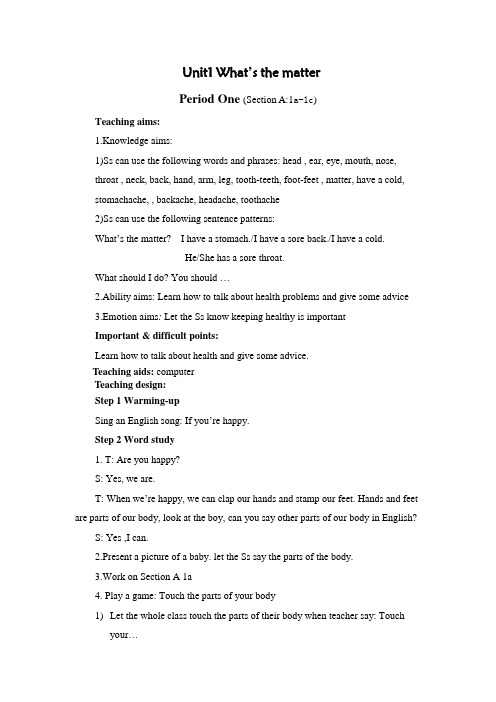
Unit1 What’s the matterPeriod One (Section A:1a-1c)Teaching aims:1.Knowledge aims:1)Ss can use the following words and phrases: head , ear, eye, mouth, nose,throat , neck, back, hand, arm, leg, tooth-teeth, foot-feet , matter, have a cold, stomachache, , backache, headache, toothache2)Ss can use the following sentence patterns:What’s the matter? I have a stomach./I have a sore back./I have a cold.He/She has a sore throat.What should I do? You should …2.Ability aims: Learn how to talk about health problems and give some advice3.Emotion aims: Let the Ss know keeping healthy is importantImportant & difficult points:Learn how to talk about health and give some advice.Teaching aids: computerTeaching design:Step 1 Warming-upSing an English song: If you’re happy.Step 2 Word study1. T: Are you happy?S: Yes, we are.T: When we’re happy, we can clap our hands and stamp our feet. Hands and feet are parts of our body, look at the boy, can you say other parts of our body in English?S: Yes ,I can.2.Present a picture of a baby. let the Ss say the parts of the body.3.Work on Section A 1a4. Play a game: Touch the parts of your body1)Let the whole class touch the parts of their body when teacher say: Touchyour…2)Ask six Ss to come to the front and do as the teacher tells them: Touchyour…if one does wrong, let him or her go back, the last one who in the front is the winner.(clap hands)Step 3 Presentation and practice1. T: Are you happy? Ss: Yes, we are.T: Look at the picture, is he happy?Ss: No, he isn’t.T: Why?(Help the Ss to answer: He has a stomachache.)2.Present other pictures, talk about health problems of the persons in the pictures. What’s the matter? He/She has a headache/ toothache /a sore back/ a sore throat/a cold and a cough.3. Let the Ss practice in pairs4. T: Suppose there is something wrong with your body .You may say: I have a headache. I have a sore throat.Step 4 ChantHead, head, I have a headache. I have a headache,Stomach, stomach, I have a stomachache. I have a stomachache,Ear, ear, I have an earache. I have an earache,Tooth, tooth, I have a toothache. I have a toothache.Back, back, I have a sore back. I have a sore back,Throat, throat, I have a sore throat. I have a sore throat.Oh, dear! Do more exercise, please and keep healthy!Step 5 listen and say1.Work on Section A 1b, listen and number the names 1-5.2.Listen again and talk about the health problems of the persons in the picture.Eg: Nancy has a toothache, Sarah has a cold,…Step6. PresentationGuessing gameThe teacher shows some part of the pictures to the Ss and let them guess .T: What’s the matter with him/her?S: Does he/she have a …?T: Yes, he/she has a cold. Can you give him/ her some advice? Whatshould he /she do?S: He /She should drink hot tea with honey/ shouldn’t speak more/ go to see a doctor… (Ss can give different advice as they like)T: What’s the matter with him/her?S: Does he/she have a …?T: Yes, he / she has a / an toothache /fever / headache / earache…Whatshould he /she do?S: He /She should go to see a dentist / shouldn’t eat ice cream/shouldn’tdrink cold water /lie down and rest / shouldn’t play basketball/ shoulddrink a lot of water./should see a doctor…Step7. PracticeGroup-work. Role play the conversations in 2b. Let the Ss read the conversations first. Then work in a group, make a new conversation .A: What’s the matter?B: My head feels very hot.A: Maybe you have a fever.B: What should I do?A: You should drink hot water and take some medicineStep 8 Summary。
unit7 Section_A_1a-1c-1
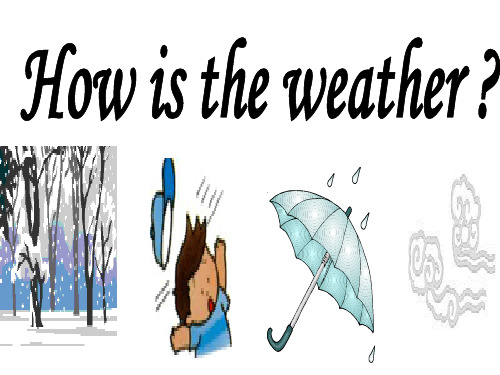
Conversation 2
Peter : Hi, Aunt Sally. Happy New Year! : How’s the weather in Moscow?
Aunt Sally: Hello, Peter. Happy New Year!
Peter
Aunt Sally: Oh, it’s snowing right now.
cloudy, raining, snowing, windy, sunny (rainy) (snowy)
2. Sentences:
How’s the weather in Beijing?
What’s the weather like in Beijing?
It’s sunny/ raining…
sunny
windy cloudy
raining
(rainy)
snowing
(snowy)
How’s the weather in Beijing?
It’s sunny in Beijing.
Beijing
How’s the weather in Moscow? It’s snowing in Moscow.
It’s raining in Shanghai.
Shanghai
A: How’s the weather in…? B: It’s… in…
Shanghai
Toronto
Beijing
Moscow
Boston
A: How’s the weather in …? What’s the weather like in …? B: It’s… in … Beijing
the sun
人教版九年级英语第一单元Section-A--1

2. word by word 一字一字地, 逐字地
Don't read the report word by word now; just skim it. 现在,不要逐字读报告,大致地看一下就 可以了。
How do you study English?
by working with friends
How do you study English?
by asking the teacher for help
How do you study English?
by making word cards
watch videos
A: Have you ever studied by …? B: …
practice conversations with friends
Let’s enjoy a video about how to learn English.
2d Read the conversation between Jack and Annie and answer the questions.
[点拨] patient的常用搭配: be patient with sb. / sth. 对某人/某事有耐心 be patient at sth.
对某事有耐心
Make conversations using the information from 2a and 2b.
A: Have you ever studied with a group? B: Yes, I have. I’ve learned a lot that way.
人教版初中英语八年级上册Unit 1Section A 1a—1c(共28页)

Where did they go on vacation?
They went to summer camp. /kæmp/
露营地, 阵营
went to New York City went to the beach went to summer camp went to the mountains stayed at home visited my uncle visited museums
I went to the Great Wall.
Where did you go?
Exercises: 用所给动词的适当形式填空。
1. Tom and Mary _______ came (come) to China last month. 2. My daughterdidn’t ________ go (not go) to school yesterday. Did she _________ practice (practice) her 3. —_____ guitar yesterday? —No, she ___________. didn’t were (be) three trees around my 4. There _______ house last year. did you do 5. —What _____ ______ (do) last weekend? studied (study) math on Saturday. —I _________
2. went to New York b City __ 3. visited my uncle __ g 4. went to summer d camp __ 5. went to the mountains __ c 6. went to the beach __ a e 7. visited museums ___
八年级英语下Unit7 section A 1a-1c课件

Would you mind making the bed?
Ok. I‘ll do it right away.
Would you mind… ?
Would you mind… ?
Would you mind… ?
Would you mind… ?
课堂训练1a 1b
Match the requests with the things in the picture above. Write the letter [a---d] in the correct boxes above. Listen and number the requests above in the order you hear them.
Now, Would you mind taking a rest and relaxing ?
See you later !
婉地向别人提出请求、建议 等.mind后接动名词形式.
2.常用答语为: No, not at all. No, I’ll do it right away. Of course not. Sorry, I’ll do it right away.
Task:
Imagine you need your classmates to help you at school .Who would you like to ask for help and what will they respond to you ?Please make a survey and complete the chart below.
unit7
Could you please give me your pen? Please lend your exercise book to me.
八年级上册unit 6 I’m going to study computer science. Section A (1a-1c)优秀评课稿

新目标英语八年级上册Unit 6 I’m going to study computer science.Section A 1a--- 1c 评课稿授课教师:评课教师:在此次英语课堂教学达标活动中,马老师所授课的教学内容选自人教新目标Go for it! 八年级上册unit 6 I’m going to study computer science. Section A 第一课时(1a-1c).主要围绕未来“job”这一主题展开各种教学活动,本课时旨在创造一个轻松、愉快的学习、交流环境,通过听、说、读、写来培养学生综合运用语言。
1a中罗列出学生之前学过的以及本单元新学的关于职业的词汇,通过问题What do you want to be when you grow up? How are you going to do that来导入对话,呈现出本单元want to be和be going to的重点句型,并由此引出学生对自己职业理想的打算和思考。
1a—1c通过大量的对话训练和听力练习,以my dream job为话题学习相关的生词和基本句型,并进而引出本单元的重要话题---- 生活目标(life goals)本课时旨在创造一个轻松、愉快的学习、交流环境,通过听、说、读、写来培养学生综合运用语言。
教材Section A 中出现的难点在于学生对未来憧憬多种多样,表达的时候会受到词汇的限制,不利于学生对部分形容词的理解和学习。
基于以上情况,在这堂课的设计中,马老师就提前做好准备,帮助学生能正确应用相关职业的词汇来谈论自己的职业理想,并在知识教学的过程中,将本堂课的情感目标贯彻始终,鼓励学生为实现自己的人生理想而努力。
马老师所授的这一节课,教师的备课重难点突出,层次性强,设计合理。
下面我想谈谈这节课的优点:一、教师素养马老师教学基本功扎实,能够正确使用英语进行教学,语言清晰,表达准确。
教学态度真诚,师生关系融洽。
新PEP人教版九年级上册英语Unit 3 Section A 1a-1c
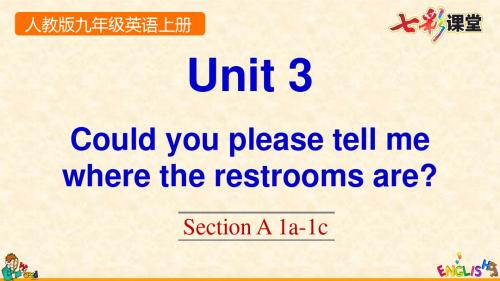
UNIT 3 SECTION A
拓 展 表示委婉请求及请求允许做某事的句型 Could you please do sth.? Would/Will you please do sth.? Would you like to do sth.? May/Can/Could I do sth.? 肯定回答常用:Sure./Of course./ No problem./ I’d love to.等。 否定回答常用:Sorry, I’d love/like to, but I…/
rest and drink coffee /have dinner
Could you please tell me where we can …?
restaurant
UNIT 3 SECTION A
Where can we …? borrow some books / get some information about the town
►You can take the NO.3 bus and get off at the National Park Stop.
你可以乘3路公共汽车在国家公园站下车。
UNIT 3 SECTION A
(2) until 此处用作连词,意为“直到……时为止”。 A. 用于肯定句。
►Please wait here until I come. 请在这里等到我来。 ►He ran until he was breathless. 他一直跑到气喘吁吁才停下。 注意:作连词的until用于肯定句中,表示主句的动作一直持 续到从句动作发生或状态出现时为止,一般可译为“直 到……为止”。在这种用法中,主句的谓语动词必须是延续 性动 词(非瞬间性动词),如 live, wait, last, love, like, stay, work, continue 等。
2020秋七彩课堂初中英语人教版九年级上册教学课件Unit 1 Section A 1a-1c
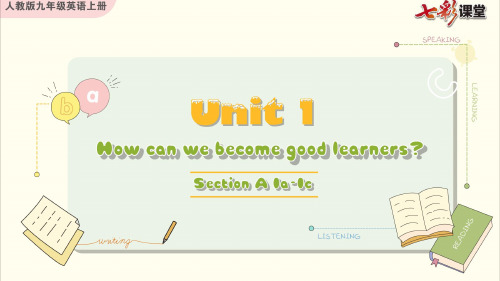
friends.
by意为“通过……(方法、途径)”, 对它提问要用how。
A. Where B. When C. How D. Why
Homework
✓ Make a survey about learning English in groups, and then interview others about their experiences of learning English. Write down your report.
➢ Objectives
To learn new words: textbook, conversation, aloud, pronunciation…
To learn to use verb + by … To learn how to learn English better. To learn to talk about how to improve English.
How do you study for a test?
I study by working with
a group.
How do you study for a test? I study by…
speaking English in class reading English texts
How do you study for a test? I study by…
不久以后,越来越多的人开始学英语了。
➢ Summary
1. by可表示位置,在……旁边 。也有“从……旁边(经过)” 之意。
2. by可表示交通、传递等的方式。 3. by可表示时间,“到(某时)之前; 不迟于”。 4. by可用于构成 被动语态 “被, 由”。 5. by可表示方式或手段,by +v.-ing形式 结构在句中作方式
Unit 3(第1课时 Section A 1a-1d)(课件)七年级英语上册(人教版2024)

Guess game!
What place is there in the school?
There are lots of books and we can borrow(借) books there.
There is a Iibrary .
Guess game!
What place is there in the school?
Peter: Excuse me. Where's Ms Gao's office?
Woman: Her office is in the teachers' building.
Peter: And where's that?
Woman: The teachers' building is across from the school hall.
Listen and imitate. Please pay attention to your pronunciation.
Conversation 3 Emma: Excuse me. Is there a shop in this school? Boy2: Yes, there is. Emma: Oh, good. Where is it? Boy 2: It's between the teachers' building and the science building. Emma: Ah, yes.I can see it. Thank you!
/hɔːl/
There is a school hall
.
Guess game!
What place is there in the school?
新思路大学英语综合教程第一册(第四版)课件Section A, Unit 1

BOOK1
Unit1
Main ideas of each paragragh of Text A
Para. 5 College is _m__o_re__th_a_n_f_u_n___. Para. 6 _E_x_p_e_ri_e_n_c_es_ to find the _p_u_rp_o_s_e of college education. Para. 7 _E_x_a_m__p_le_s_o_f_r_e_a_s_o_n_s _ for entering college. Para. 8 To experiment and consider the purpose for college education and its significance to their future life.
BOOK1
Unit1
Effects:
The narrator describes what “you” do and lets you into your own thoughts and background.
In books popular with younger readers, it allows the reader to “be” the central character in the story provides an immersive(沉浸式) reading experience, enhancing what is at stake for the character and reader.
BOOK1
Unit1
Task 2:Text to Life
Directions: Discuss with a partner the following questions. Share your thoughts and comments with the class. Do you like your major? Why did you choose your major? Do you want to choose a job in related career fields? Do you think it is possible to combine profession and passion?
最新人教版英语八年级上Unit 6 Section A 1a-1c最好

4.actor
math really hard d. study ______
1c Pair work
A: What are you going to be when you grow up? B: I’m going to be a basketball player. A: How are going to do that? B: I’m going to practice basketball every day.
musician
…
runner
Talk about your dream jobs.
I want to be a/an… when I grow up
1. want to be+职业 表示“想成为一名……” e.g. I want to be an act when I grow up. 我长大了要当一名演员。 2. grow up 表示“成长”
I want to be 、、、
Read the sentences carefully.
What do you want to be when you grow up? I want to be an engineer. How are you going to do that? I’m going to study math really hard.
I want to be a/an… when I grow up
Talk about your dream jobs.
I want to be a/an… when I grow up
Talk about your dream jobs.
I want to be a/an… when I grow up
英语七年级下人教版新课标Unit_3_How_do_you_get_to_school SectionA 1a-1c教学设计新部编版
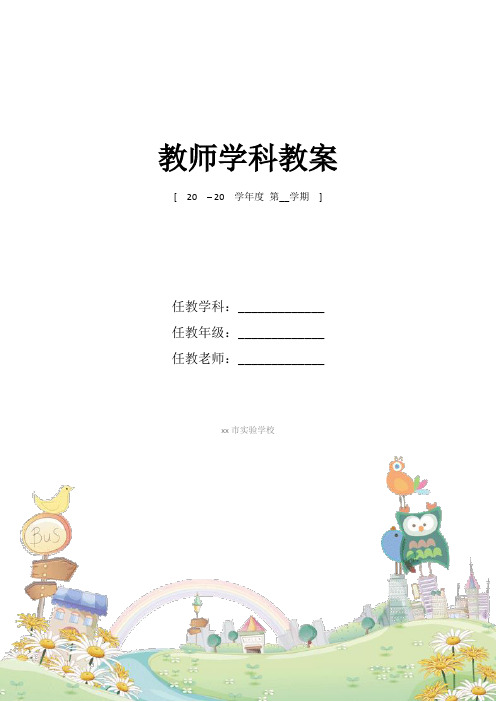
教师学科教案[ 20 – 20 学年度第__学期]任教学科:_____________任教年级:_____________任教老师:_____________xx市实验学校英语七年级下人教版新课标Unit 3 How do you get to school Section A 1a-1c教学设计熨斗中学阮班玉一、概述本单元以“交通工具”为中心话题,围绕谈论“How do you get to school?”而展开教学及运用How long/How far 询问去某地的时间和距离,而Section A (1a-1主要是学习交通工具的单词和运用how引导的特殊疑问句,询问到达目的地的,这一话题贴近学生们的日常生活,它继第三单元谈论“假日计划”后安排这样一个话题,符合学生的认知结构和年龄特征,它将为本单元后面的课时做好铺垫,也为学生口语交际打下基础。
本课是本单元的第一课时。
本单元认识掌握交通工具,然后学习短语take the subway, take the train, ride a bike, walk等,最后学习句型How do you get to school? I take the bus. 在本节课中学生要学习练习含有第一,二人称和第三人称单数,How 引导的特殊疑问句。
How doe Mary get to school? She takes the subway.二、教学目标分析:1. 知识与技能:1) 能掌握以下单词:bus, train, subway, taxi, walk, pane, ride, bike.2) 能掌握以下短语:take the bus, take the subway, take the train, take the taxi, take the plane, take the car,drive the car, ride the bike, walk.3) 能掌握以下句型:①—How do you get to school?ride my biketake the busI take the subway to school.take the taxitake the carwalk②—How does Mary get to school?rides my biketakes the busShe takes the subway to school.takes the taxitakes the carwalks4)学会将课内外习得的生词和习惯用语、谈论交通工具等综合运用。
2014春新目标八年级英语下册Unit_3_could_you_please_clean_the_room_Section_A 1a-1c

Look and say
Could you please ...?
get up early
sweep the floor
cook for us
Could you please not ...?
look out of the window
play soccer here play the computer games
sweep the floor
Try to remember the pictures in order.
Try to remember the pictures in order.
1 2 3
do the dishes
fold the clothes
clean the living room
Байду номын сангаас
4
5
sweep the floor (Yes, sure.)
Which group can ask and answer more questions with the verb phrases?
Chain drills
• • • •
A: Tom, could you please do the dishes? B: Yes, sure. Ann, Could you…? C: Sorry, I can’t. Jim, … D: …
a dirty room
Could you please clean your room? Yes, sure. I’ll do it right away. 不好意思,我马上做。
Could you please take out the rubbish? Yes, Sure./ Of course. / All right. / OK.
新目标(人教) 八年级下册英语教学课件 Unit1 Section A(1a-1c)

He has a toothache.
She has a cough.
1a
Look at the picture. Write the correct letter [a-m] for each part of the body.
Check the answers!
__h_ arm _e__ back __a_ hand __j_ head _d__ neck _m__ nose
e.g. Lily had a heart problem. I have a headache now because I stayed up too late last night. She had a sore back after climbing the mountain.
3. She talked too much yesterday and didn't drink enough water. 她昨天说话太多了又没有喝足够多的水。 too much 的用法: ①作形容词词组,修饰不可数名词。
e.g. The students have too much homework. ②作副词词组,修饰动词。
e.g. Don't watch TV too much. ③作名词词组。
e.g. He has given me too much.
辨析:too much /much too/ too many much too 意为“太”,用于加强语气,常用来修饰形容词或副词。 e.g. The question is much too difficult for me. too many 意为“太多的”,用来修饰可数名词复数形式。 e.g. There are too many people in the station.
人教版英语七年级下册Unit 4 Section A 1a-1c 课件

What are the rules?
Well, we can’t arrive late for class. We must be on time.
Don’t run in the hallways.
What are the other rules?
Don’t eat in the classroom. You must eat in the dining hall.
2) 如果后面跟要听的事物,应跟介词to再跟事物。 Listen to our teacher carefully. 认真听老师讲。
hear, listen和sound都有“听”的意思, 但三者是有区别的。 1) hear “听说” , 侧重于“听” 的内容。例如:
I’m sorry to hear that you are ill. 听说你生病了,我很难过。
4. --What are the rules? 规则是什么?
--Well, we can't arrive late for class.
哦,我们上课不能迟到。
1) rule规则,可数名词,构成的短语有:
obey the rules 遵守规章
be against the rules break the rules
1c
Student A is a new student. Student B tells Student A about the rules above.
What are the rules?
Well, we can’t arrive late for class. We must
be on time.
4. Don’t listen to music 2
Section A-1
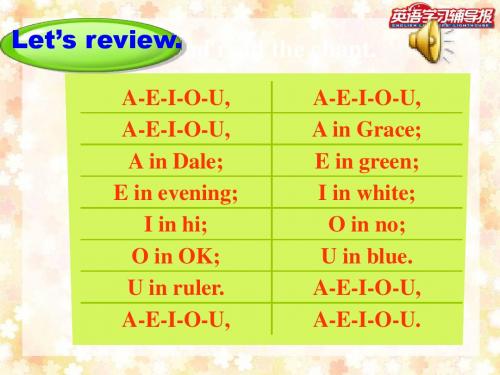
• 2.“What’s your name?” • “My name is Gina.” “你叫什么名字?”“我叫吉 娜。” • 两人初次见面互相询问姓名时可用这个句型。 如想反问时可说:And you?或者And what’s your name?如: • A:Hello. What’s your name? • B:My name is Alan ./I’m Alan. /Alan . And you?/And what’s your name? • A: My name is Gina./I’m Gina. / Gina.
What’s your name? his her
My name’s / My name is … I’m / I am … His name’s / His name is … Her name’s / Her name is …
作主语: I (我) you (你) he (他) she (她)
What’s your name?
your :你的; 你们的 What’s是 What is的缩写,意为“是什 么?”。 I’m 是I am 的缩写,意为“我是……”, “我叫……”。
My name’s Jenny. I’m Jenny. Jenny.
What’s his name? What’s her name? his :男他的 her:女她的
1c. PAIRWORK
Practice the conversations above with your partner. Then greet your classmates.
What’s your name? … Hello, … I’m …
A: Hi. My name’s … A: Nice to meet you, too.
- 1、下载文档前请自行甄别文档内容的完整性,平台不提供额外的编辑、内容补充、找答案等附加服务。
- 2、"仅部分预览"的文档,不可在线预览部分如存在完整性等问题,可反馈申请退款(可完整预览的文档不适用该条件!)。
- 3、如文档侵犯您的权益,请联系客服反馈,我们会尽快为您处理(人工客服工作时间:9:00-18:30)。
2a Listen. Number the activities [1-5] in the order you hear them.
How often do you watch TV? Twice a week.
Activities How often a. ___ every day 3 go to the movies b. ___ once a week 1 watch TV c. ___ twice a week 5 shop d. ___ three times a week 4 exercise e. ___ once a month 2 read twice a month
b
c
d e
a
What do you usually do on weekends? I often go to the movies.
A: What do you do on weekends? B: I usually watches TV. A: Do you go shopping? B: No, I never goes shopping.
5. (2011北京) --- ____ do you play football --- Once a week. A. How much B. How long C. How often D. How far 6. (2011浙江宁波) — _____ do you have an Art Festival in your school? — Once a year. A. How long B. How often C. How far D. How soon
how often “多久一次”, 常用来询问某一动 作或事情发生的频率。 -- How often does your mother travel? -- Once a year. 回答:never (从不) „„ once a day/week(一天/周一次) twice a week/month (一周/月一次) three/four/five/six … times a month / year 一月/年 三/四/五/六„„次
c
d
e
1. help with housework 2. watch TV 3. exercise
4. read (a book) 5. go shopping
1b Listen and write the activities next to the correct frequency words.
Fill in the blanks with sometime, some time, sometime or sometimes. sometime next month. 1. We'll go to Beijing ________ 2. _________ Sometimes I get up very late on Sunday morning. 3. It took him _________ some time to finish the book. some times last 4. He met the woman __________ month.
skate
usually often
always
sometimes hardly ever never
根据汉语句子, 用适当的频率副词或表示频 率的词组完成英文句子。 1. 有钱人未必总是幸福的。 always happy. The rich are not _______ 2. 他通常7点钟去学校。 usually goes to school at seven He _________ o’clock. 3. 他上学经常迟到。 often late for school. He is ________
2b Listen again. Match the activities in 2a with how often Cheng Tao does them.
Activities a. ___ go to the movies b. ___ watch TV c. ___ shop d. ___ exercise e. ___ read How often every day once a week twice a week three times a week once a month twice a month
Do you know their difference?
• sometime • some time • sometimes 某个时间 一段时间 有时
• some times
几次
I sometimes go to school by bus. I will go to America sometime this year. I have been to the Great Wall for some times. I watched TV for some time last night.
4. 天气忽冷忽热。 It is _________ sometimes cold and __________ sometimes hot. 5. 这些天我几乎不出门。 I _______ hardly ever go out these days. 6. 我父母从不吵架。 never quarrel with each My parents ________ other. 7. 她一天吃三次蔬菜。 three times a day She eats vegetables ________________.
What does he / she usually do on weekends? He / She usually … always … sometimes … often …
What does he / she usually do on weekends?
He / She usually … always … sometimes … often …
3. --- _______ were you away from Shanghai last year? --- About two weeks. (选出正确答案) A. How often B. How soon C. How long
4. --- How often does Lily play soccer? --- She doesn’t like it, so she ______ plays it. A. always B. hardly ever C. usually D. often
play the piano
go shopping
play tennis dance
1a Make a list of the weekend activities.
b a
What do you usually do on weekends? I often go to the movies.
Unit 2
Section A
Period 1(1a—2d)
What do you usually do on weekends?
different activities
do housework
exercise
use the Internet
go to the movies
watch TV
read
do housework
go to the movies
play tennis
play the piano
exercise
go shopping
ห้องสมุดไป่ตู้
watch TV
use the Internet
read
What do you usually do on weekends? often I usually … often … sometimes … always …
一周/一个月一次
一周/一个月两次
• twice a week / month
• three times a week / month 一周/一个月三次
• once or twice a week / month 一周/一个月 一次或两次
“次数”的表达方法
一次 once, 两次 twice,三次或三次 以上用基数词加上 times, three times, five times, one hundred times. 表示“„„几次”的表达方法是:
根据提示完成下面问题。
1. We drink milk every day.
How often do you drink milk? (对划线部分 _________
提问。)
2. ---How often do you play football?
--- _________. (选出正确答案)
A. Once a week C. Very well B. In the evening D. Twice
对划线部分提问。
I usually watch TV on weekends. What do you usually do on weekends? I watch TV every day.
How often do you watch TV ?
对划线部分提问。 1. 2. 3. 4. 5. 6. 7. 8. I usually play soccer. They often go to the movies. He sometimes watches TV. I shop once a month. He watches TV twice a week. I hardly ever surf the Internet. Zhao Lin often goes skateboarding. The boy always plays computer games.
